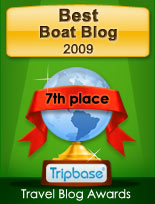Worlds Apart
Lake Victoria is a nice 10-minute walk from the front door of my friends’ house. On this casual stroll I met a woman. She was preparing a meal outside, so I struck a conversation. “Why don’t you talk like your friends?” She asked, referring to my American friends who had the Kenyan dialect dialed in. I summoned my best impression and made instant friends.
She was a widow, as was her sister who lived in the house 10 feet from hers. Both had several children. She introduced me. Several of the children were dressed in school uniforms, which, guessing by the worn look, had been passed down from the previous. The others were either too old or young or unlucky enough to afford an education. She grabbed a chair from inside her small two-room house, and placed it in the shade, where she invited me to sit as she blew and fanned the coals that cooked her vegetable root.
It was remarkable how freely the children spoke of their condition. They shared their names, their age and relation. They told me what they wanted to do in life (mostly become doctors and a couple-teachers). They told me of their father who died a few years ago and pointed to a small mound, not far from the walls of their house. “My dad died around that time too,” I shared, hoping to connect in their loss. But strangely there was little sense of loss. There were simply facts, reality.
It’s a reality we are shielded from in the United States. Of course there is tragedy in both places, but in the U.S., death sits on the curb like a homeless man. We see it out of the corner of our eye. We turn our heads, and avoid contact as we side step over the obvious, pretending it doesn’t exist. Then once it’s far enough behind us, we raise our heads and resume conversation, as though nothing happened.
But in Africa, when HIV infects up to 40% of your population, and when malaria is more common than the common cold, death is a part of life-it is reality. We talked shortly of the children’s father, and moved on. The mother would fan the flame, then stir the pot, then tend to the toddler who wandered naked as the day. Then return to conversation, smiling, interjecting. Each kid had questions, fascinated with me and my camera. Each gathering close after every shot, giddy to see their digital reflections.
“I want to talk to you about America,” said one boy. You could see his mind search for questions. “Tell me about it… is it true you have machines that wash your clothes?” “We even have machines that wash our dishes, even dry our clothes.” “Machines to dry your clothes?!” Said the mother unsure. “Machines do everything for you,” the boy replied distantly, imagining what must have been a futuristic scene. We laughed and joked as our questions painted pictures of two totally different worlds.
One girl commented on white girls not being able to carry things on their heads, a skill used daily here. Another boy analyzed my arms, then deducted that white people must need more hair on their bodies because it is so much colder where we come from. I asked about African dancing, suggesting we have a dance party sometime. I commented on the fact that no one walked around at night, explaining how much I love roaming streets by the light of the city. “There are entire cities with lights?” asked a boy, baffled by a place where more than just a few houses had power.
There wasn’t much food but the mother insisted I not only eat, but also take some back to my friends. I ate bananas that tasted like potatoes, and potatoes sweeter than bananas. Then with the light beginning to change I shook hands and thanked them for their hospitality. “I hope I will see you again,” said the boy most interested in my American life.
“I’m sure we will.” I smiled and started back up the rocky path to my friends’ house.






0 comments
Kick things off by filling out the form below.
Leave a Comment